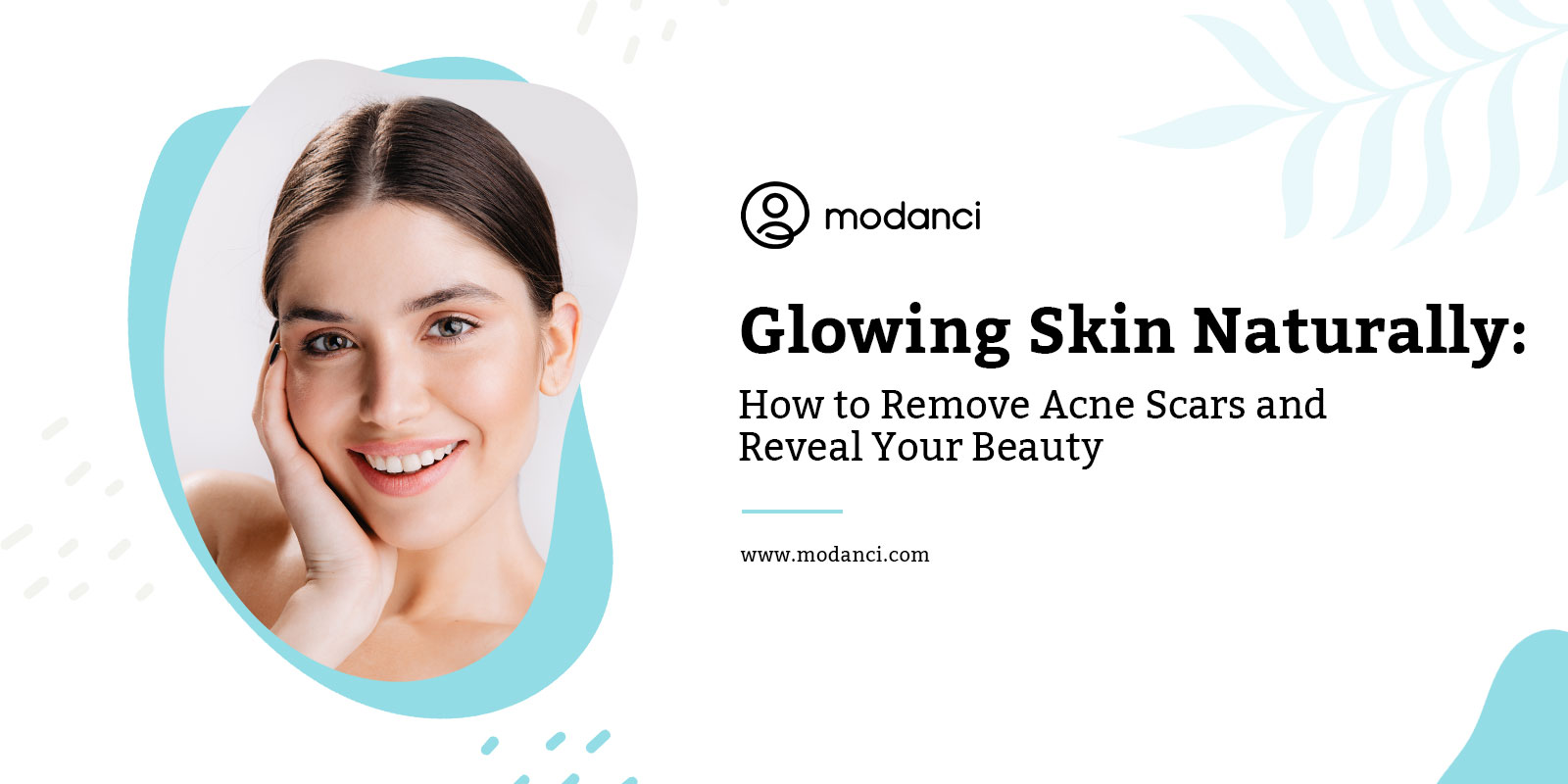Are you dealing with persistent acne scars that popular remedies fail to address? Treating acne scars promptly is important to prevent them from becoming a long-term issue.
Acne scars are marks that remain on the skin after healing from acne. They are quite common, affecting around 80% of acne sufferers. These scars can appear as brown or red spots, raised lumps, or small indentations on the skin. Prolonged acne can often lead to scarring, so it is important to treat acne promptly to prevent scarring.
Ayurveda offers ancient herbal remedies that promote cell renewal, inhibit melanogenesis, and enhance overall skin immunity to reduce these scars effectively.
Continue reading to discover preventive measures for acne scars and natural home remedies to remove the same.
What Causes Acne Scars?
According to Ayurveda, skin discolouration and deformities are often caused by an imbalance in the doshas, resulting in the accumulation of harmful amatoxins. Ayurvedic texts describe a three-step treatment called “Vrana Vastu” to address acne scars. This treatment involves purifying the skin to restore its natural colour, promoting tissue development and remodelling, and rejuvenating the hair follicles to restore the skin to its original condition.
Acne lesions develop when a hair follicle becomes blocked by an accumulation of sebum, dirt, and dead skin cells. If bacteria on the skin become trapped in these clogged pores, it leads to inflamed acne in pustules, papules, or nodules.
The occurrence of acne scars is influenced by several risk factors, as mentioned below:
1. Inflammatory Acne Conditions
The depth, severity, and duration of inflammation play a role in developing acne scars. Severe forms of acne, such as cystic and nodular acne, are more likely to cause scarring due to deeper tissue damage.
2. Delay in Treatment
Prompt treatment of acne can prevent prolonged inflammation, a common cause of acne scars.
3. Popping Acne Lesions
Squeezing or popping acne lesions can worsen the condition, causing the follicle wall to rupture easily. This leads to the spread of infection and increased inflammation, increasing the likelihood of acne scars.
4. Hormonal Imbalances
Hormonal changes in the body, particularly during menstruation, pregnancy, and menopause, can contribute to severe inflammatory acne conditions that are more likely to result in deep scars.
5. Genetic Influence
Having a family history of scarring increases the risk of developing acne scars.
6. Smoking
Smokers are more susceptible to acne scars. The harmful substances in tobacco smoke hinder the skin’s healing and collagen production.
How to Remove Acne Scars Naturally?
With appropriate treatment, minor acne scars can be eliminated, and severe scars can be diminished. In mild cases of acne, scars and marks may naturally fade away quickly. However, deep atrophic scars may necessitate long-term treatment.
Following are a few Natural Remedies for removing Acne Scars and giving your skin a natural glow:
1. Onion and Aelovera
Using a combination of onion extract and aloe vera can help in removing acne scars. Both ingredients contain natural tyrosinase inhibitors like quercetin and aloin, which aid in healing acne scars and reducing hyperpigmentation caused by acne.
To use this remedy, mix a whole onion with fresh aloe vera gel. Apply this mixture twice a day to effectively eliminate acne scars and marks.
2. Pineapple and Papaya
Using a combination of papaya and pineapple can help lighten the skin and reduce acne scars. The natural enzymes found in these fruits promote skin cell renewal, resulting in a more even tone and appearance.
To use, blend both ingredients together, including the pineapple stem, which contains bromelain, an anti-inflammatory enzyme. Apply the mixture regularly to remove acne scars from the face.
3. Honey
Honey, a versatile natural remedy, can help with acne scars without requiring a visit to the drugstore. Honey has been used for various medicinal purposes, such as treating burns, wounds, and herpes. Research suggests that honey can expedite wound healing and minimise the likelihood of scarring.
Studies have demonstrated that applying honey directly to wounds can aid in healing by cleansing and clearing the wound, thanks to its antibacterial properties. Additionally, honey can combat infections that may contribute to the development of additional acne.
4. Aloe Vera
Aloe vera, like honey, is a popular natural remedy often used at home. It has similar effects in promoting the healing process for acne. Research suggests that applying aloe vera directly to wounds can reduce inflammation and the size of scar tissue.
Aloe vera gels and products are readily available at drugstores, but you can cultivate the plant yourself. You can harness its benefits by cutting into the leaves and applying the sticky gel directly onto the skin.
5. Turmeric Powder
Turmeric powder possesses anti-inflammatory properties that can effectively reduce bacterial growth. Additionally, it aids in skin regeneration and diminishes the appearance of scars.
6. Essential Oils
The ancient Ayurvedic texts emphasise the significance of Abhyanga therapy, which involves herbal massage, in healing scars and skin discolouration. Regular massage enhances blood circulation, eliminates damaged skin, and promotes the renewal of cells. Abhyanga also helps balance the doshas and eliminates harmful amatoxins that impede wound healing and contribute to scarring.
To expedite the healing of acne scars, massage the following essential oils onto the affected areas. Use your preferred carrier oil twice daily, such as coconut, almond, castor, or sesame.
- Tea Tree Oil
Promotes new tissue growth, aids in wound healing, and relieves irritated skin.
- Lavender Oil
Promotes the regeneration of new tissue, aids in wound healing, and relieves irritated skin.
- Geranium Oil
Possesses anti-inflammatory and antibacterial properties that could aid in healing damaged skin.
- Rosehip Oil
Has anti-inflammatory effects, diminishes acne scars and hyperpigmentation, and promotes skin brightening.
How can Acne Scars be avoided?
To prevent acne scars, it is essential to take specific measures:
- Reduce inflammation by using antibacterial and anti-inflammatory herbs or medications, promoting quick healing and preventing damage to the skin tissue from acne.
- Avoid picking or popping pimples, as this can increase the risk of scarring.
- Seek timely treatment for acne to prevent the development of scars. Consult a doctor for appropriate care.
- Protect your skin from the sun by wearing sunscreen. Overexposure to the sun can worsen acne marks and scars, lead to skin damage and hyperpigmentation, and hinder skin healing.
- Allow your acne to heal completely without picking at scabs. Scabs act as a protective layer and aid in safe healing. Picking at them can cause infections and delay tissue repair.
- Avoid excessive exfoliation during an acne breakout, as it can increase the chances of scarring. Opt for a gentle face wash with natural fruit acids that may help diminish the appearance of scars.
- Quit or reduce smoking. Tobacco smoke exposure weakens the skin’s immunity and can worsen existing acne conditions.
- If your skin is prone to scarring, consult an ayurvedic physician for guidance on the best skincare routine and diet to protect your skin and enhance its immunity.
Conclusion
Acne scars can be bothersome and challenging to eliminate, so it’s important to take preventive measures. Timely treatment of your acne can save you time and money spent on scar treatments.
If acne scars persist, it is advisable to consult an Ayurvedic doctor. They can provide personalised treatment based on your unique body constitution (Prakriti) and dosha levels. This holistic approach can effectively treat acne scars and prevent their recurrence. We at Modanci provide Personalised Skin Care backed by Ayurveda.
FAQs
1. What are some natural remedies for removing acne scars?
Honey, a natural remedy, has multiple benefits for acne scars. It can expedite wound healing, reduce scarring, and has antibacterial properties that combat infections associated with acne. Applying honey directly to wounds can cleanse and promote healing. Aloe Vera is a natural remedy with similar effects as honey.
2. How long does it typically take for acne scars to fade?
The duration for acne scars to fully fade can range from 3 to 6 months, depending on the severity of your acne and the extent of skin damage.
Acne-related hyperpigmentation, which leads to brown or black spots and red marks from post-inflammatory erythema, may fade faster than deep scars.
Adhering to a suitable Ayurvedic skincare routine can aid in faster skin healing. However, it is advisable to consult a doctor and explore alternative treatments for deep atrophic scars.
3. Can I prevent acne scars from forming in the first place?
To reduce inflammation, use antibacterial and anti-inflammatory herbs or medications, promoting healing and protecting skin tissue from acne damage. Avoid picking or popping pimples to minimise the chance of scarring.
You should also seek prompt acne treatment to prevent scarring. Consult a doctor for proper care.
4. What are some ways to promote overall skin health and achieve glowing skin?
To prevent acne and promote overall glowing skin, maintain proper skincare by following good skin hygiene and adopting an Ayurvedic Dosha-balancing skincare routine and diet. Maintain a stress-free lifestyle by incorporating exercise, yoga, and meditation into your routine to promote overall bodily well-being. Explore the personalised solutions offered by Modanci.
Read More:
- 21 Effective Home Remedies for Soothing Skin Rashes Naturally
- Say Goodbye to Dryness: 12 Effective Home Remedies for Dry Skin
- 10 Natural Home Remedies for Glowing Skin: Tips for a Healthy and Radiant Complexion
- Clear Skin Ahead: Tips and Tricks for Getting Rid of Acne
- Clear Skin: A Comprehensive Guide to Removing Acne Scars




